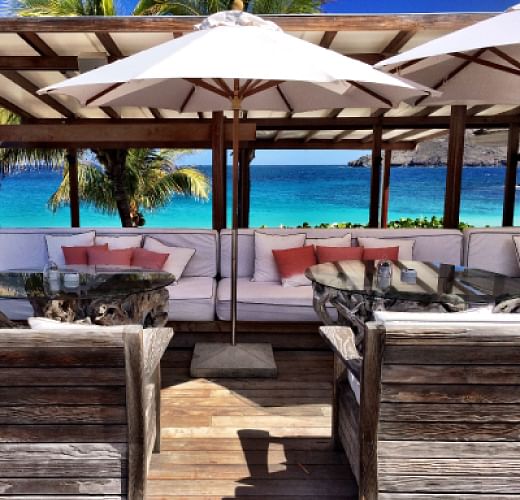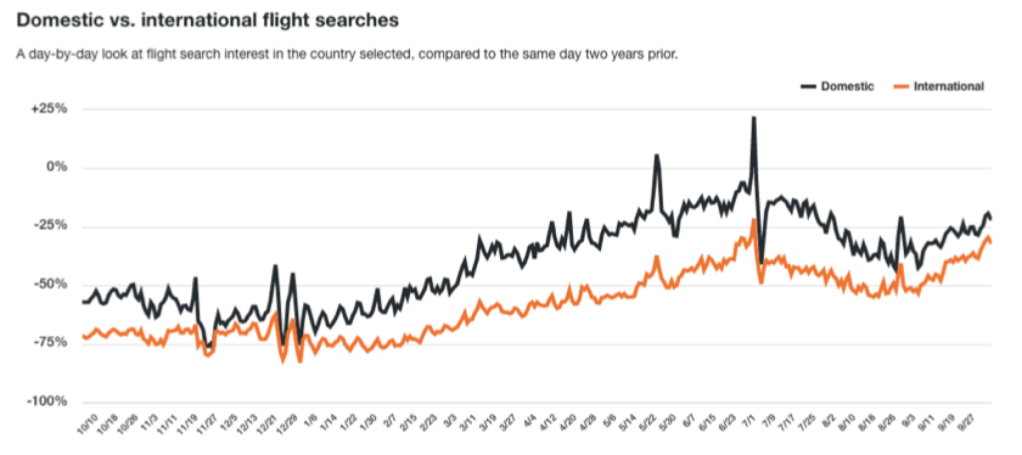Revenge travel and the rise of the mobile office
October 18, 2021 2:09 pm

Here is a deeper look into the phenomenon.
Pent-up demand to travel freely again, or as freely as can be under COVID restrictions, has resulted in an increase in “revenge travel.” That has come to mean the strong desire to travel even more than before the onset of the pandemic—more about getting revenge on the coronavirus and more than a year lost to lockdowns.
Tina Edmundson, global brand and marketing officer for Marriott International, views revenge travel as the act of making up for lost time, as well as lost opportunities. Whether it was missing out on the chance to explore new destinations and cultures, or to connect with family and friends, people feel as though they have been robbed of time and experiences.
"The past 18 months have forced people to reevaluate the importance of travel in their lives. For many, what was seen as a 'want' has really been reclassified as a 'need,'" explains Edmundson. "Travel is good for the world. It opens minds, fosters connection, broadens perspectives, and fuels inspiration. The pandemic made people reprioritize, and travel has risen to the top of the list as many people have developed a new appreciation for travel or it has taken on a greater meaning and higher importance."
According to a recent survey from SAP Concur, 96% of 3,850 business travelers in 25 global markets say they’re now excited to venture abroad again for work, and 80% admit to worrying that unless they increase business travel, their professional lives will suffer.
"The frustration that people have felt during COVID-19 has started to come to a head as restrictions have eased, in both the tourism and corporate sectors," says Vivi Cahyadi Himmel, CEO and cofounder of corporate housing provider AltoVita, which works with large companies worldwide, including Google, Adidas, and J.P. Morgan. "When it comes to business travel, the knock-on impact of ‘revenge travel’ is that employees are now open to extended stays, traveling further afield, and looking for a more diverse range of accommodation."

According to Kayak's public Flight Trends Data Dashboard, which provides a daily look at travel trends domestically and internationally, domestic travel search interest surpassed 2019 levels on May 23, 2021—for the first time since the start of the pandemic—and reached its peak on July 1, 2021, with a 22% increase compared to the same time in 2019.
The desire extends to consumer travel as well, further blurring the lines between traveling for business or pleasure as more people are just combining the two: working from a hotel at a dream destination.
"People are scrambling to make up for lost vacations," Kayak CEO Steve Hafner tells Fortune. "Now that most can work from anywhere, who wouldn’t want to work from a beach in Hawaii?"
And now, those who are traveling are more willing to splurge on trips. The average price for trips booked by Americans this fall is $776, compared to $588 globally, suggesting Americans are spending significantly more on travel than the rest of the world, says Chris Hsi, head of market research at Tripadvisor.
"This fall, the majority of Americans (84%) who are traveling are staying in the U.S.," Hsi says. "And 41% of them will stay within two hours from home, demonstrating that most of us aren't quite ready to venture too far. Long weekend trips (between two and five days) will be most common, so we can expect quick getaways, with potential for 'workcations' over the coming months."
Edmundson says Marriott is seeing that this desire to travel, combined with a newfound flexibility when it comes to remote work or learning, has resulted in travelers staying longer at a destination. Destinations that in the past have been traditionally seasonal and offer easy access to nature and wide-open spaces—such as national parks, the mountains, or beachfront communities—continue to be popular with travelers who may be looking to fit in a hike or go for a surf before a day of video calls, she notes. "We are also seeing a new willingness to embrace the now and act on those bucket list trips. In a similar vein, there is greater demand for unique, remote, and off-the-beaten-path destinations as travelers seek places that offer access to nature or a new perspective."
But even as many travelers preferred outdoor and nature destinations during lockdown in order to avoid crowded tourist spots, the focus is gradually shifting back toward cities. Tripadvisor says it's a 50/50 split between big cities and beach destinations in the top 10 destinations Americans are visiting this fall, with Las Vegas, New York City, Orlando, Myrtle Beach, S.C., and Ocean City, Md., rounding out the top five most popular U.S. destinations for fall travel, respectively. Hsi singles out New York City, in particular, which hasn’t been on any of Tripadvisor’s “most popular” lists since the pandemic started.
The mobile-office model
A recent report from AltoVita about the state of the flexible-rentals market coming out of COVID-19 found that 68% of the flexible-rental sector is seeing an increased demand for extended stays, and 59% is seeing a demand for large spaces. "Taking longer trips and combining work with a holiday (workcations), as well as having more space to travel with friends or family, [are] a sign that working remotely provides greater flexibility and autonomy for employees," Himmel says. "In turn, it has a positive impact on their well-being and productivity, and more and more companies are beginning to see the long-term benefits."
In terms of the current working landscape, some offices have reopened, others are still closed, and some have been closed altogether. AltoVita is also seeing some companies that are adopting "mobile offices" and choosing different locations to work around the world, or to bring team members together in a single location for extended meetings (every month or quarter). Employees can then benefit from increased productivity and the ability to blur the boundary between work and travel.
"The pandemic has altered employees’ working habits on a huge scale, with many still choosing to work from home, or from anywhere they choose to," Himmel says. "The appetite for flexibility is there, and we know that employees want to be able to work from anywhere in the world, at their own convenience."
However, with more and more companies adopting a mobile-office model (or working remotely/from home permanently), staying safe and compliant has never been more important. And with the Delta variant and the CDC adding more destinations to the high-risk list, travelers are still making concessions to safety: 72% will travel by car, and 91% are likely to stay with friends and family or in a branded hotel, according to PwC’s holiday travel outlook.
"Travel right now is certainly more thoughtful and taking a slower pace. People are staying longer, and they are more interested in exploring a place on a deeper and more meaningful level," Edmundson says. "They are no longer hopping between multiple destinations on one trip. There is a real, genuine interest in supporting local businesses and institutions that may have taken a hit during the pandemic. People want these independent entrepreneurs to survive, so whether it’s making the time to visit a hole-in-the-wall restaurant or a mom-and-pop shop, people are eager to support these special places."
As the number of new Delta variant cases rise, particularly in North America, consumer optimism of travel intent has slightly plateaued, Tripadvisor's Hsi notes. Leisure travel recovery will continue to be uneven, but he says many travelers still remain optimistic and excited. "New variants and uncertainty have caused travelers to shift their priorities. Free cancellation and 'pay at stay' have become popular when searching for accommodations. And cleanliness (which travelers equate to personal safety as a public health matter) remains a top priority, as Tripadvisor's Travel Safe filter is the most commonly used on-site."
As the explosion of Zoom calls demonstrated, technology is a key for future-proofing and supporting mobile offices and remote workers in the long term. As outlined in AltoVita’s recent survey, flexible-renting providers in the sector have prioritized high-speed Internet (43%), providing desk and office spaces (29%), and laptop-friendly surfaces (9%). When it comes to the best lease structure to support working from anywhere, 74% favored monthly leases and over two-thirds (68%) began offering flexible cancellations.
"As well as making these considerations to support flexible travel, resources required for long-term support should be continually developed to meet the needs of consumers," Himmel says. "For example, when it comes to supporting our sector, we know that one size does not fit all, and each traveler has different needs and preferences." In order to accommodate every type of traveler—from corporate employees to digital nomads—AltoVita made several additions to its platform, including expanding extended-stay assets types from serviced apartments, single-family homes, and villas to also include hotels, apart-hotels, and co-living.
"The importance of safety, security, and compliance in corporate travel is more important than ever," Himmel says. "Over the coming months, businesses need to be more aware of this, as well as the appetite for ‘working from anywhere’ and the ‘mobile office’ amongst their employees."
Himmel is confident that revenge travel is here to stay—and is still going strong despite the threat of a tough winter ahead. With 3.61 billion people worldwide now vaccinated, and counting, the latest statistics highlight that the majority of people across business hubs in Europe, Asia, and North America have received protection against COVID-19.
While there is some concern regarding new strains and variants, she says demand for business travel is increasing regardless as many employees are concerned about the business impact of halting travel again, and what it might do to their future career prospects. Many cities and countries are also concerned about the economic impact of lower travel levels continuing.
"The world is tired of the setbacks that the pandemic has brought about, and although there is definitely a need to approach the next few months cautiously, with the right processes in place, businesses and their employees will remain confident in working from anywhere," Himmel says. "Ultimately, working remotely has a lot to offer, and now that employees have greater flexibility on location and time frames, we would be surprised if many more companies don’t follow suit when it comes to ditching offices in favor of the mobile office long term."
Ref: https://fortune.com/2021/10/09/what-is-revenge-travel-pandemic-covid-delta-variant/